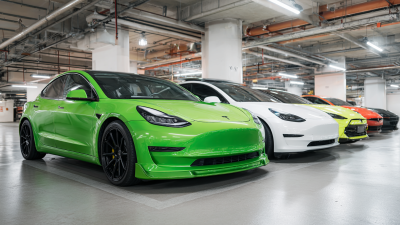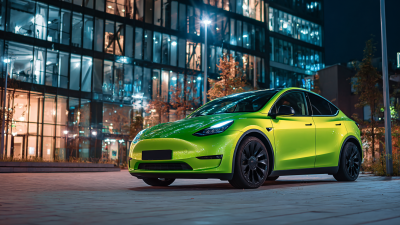 As the automotive industry shifts towards sustainability,
electric vehicles (EVs) are at the forefront of this evolution, with EV SUVs leading the way.
According to a recent report by BloombergNEF, global electric SUV sales are projected to reach
35 million units by 2040, accounting for
62% of all passenger EV sales. This surge is driven by a
growing consumer preference for spacious, versatile vehicles that combine eco-friendliness with performance.
Major automakers are now investing heavily in EV SUV technology, recognizing that this segment not only meets
rising environmental standards but also appeals to the desire for advanced features and safety. As manufacturers
roll out innovative models designed to enhance driving experiences while minimizing carbon footprints, the
EV SUV is set to redefine the future of eco-friendly driving, offering a compelling alternative to
traditional combustion-engine vehicles.
As the automotive industry shifts towards sustainability,
electric vehicles (EVs) are at the forefront of this evolution, with EV SUVs leading the way.
According to a recent report by BloombergNEF, global electric SUV sales are projected to reach
35 million units by 2040, accounting for
62% of all passenger EV sales. This surge is driven by a
growing consumer preference for spacious, versatile vehicles that combine eco-friendliness with performance.
Major automakers are now investing heavily in EV SUV technology, recognizing that this segment not only meets
rising environmental standards but also appeals to the desire for advanced features and safety. As manufacturers
roll out innovative models designed to enhance driving experiences while minimizing carbon footprints, the
EV SUV is set to redefine the future of eco-friendly driving, offering a compelling alternative to
traditional combustion-engine vehicles.
The next generation of electric SUVs is set to revolutionize eco-friendly driving, primarily through innovative battery technologies. One of the most exciting developments is the expected arrival of new solid-state batteries, which promise a significant leap in performance and range. For instance, a major automotive manufacturer announced plans for a 2026 launch, aiming for battery ranges of up to 1,000 kilometers and a cost reduction of 20% compared to its current model. This significant advancement could reshape consumer expectations regarding electric vehicle (EV) range and affordability.
Moreover, the introduction of solid-state batteries is anticipated to enhance charging speeds and overall vehicle efficiency. Reports indicate that these batteries could hold more energy and charge faster than traditional lithium-ion batteries, thus addressing one of the main challenges EVs currently face—charging time and range anxiety. Tips for potential EV buyers to consider include researching models that incorporate these advanced battery technologies and keeping an eye on upcoming releases that promise enhanced performance and sustainability.
As manufacturers push towards sustainable fuels, figures reveal a growing trend in the adoption of electric vehicles. Recent studies show that the global EV market is projected to reach over 26 million units by 2030, reinforcing the need for continuous innovation in battery technology to meet increasing consumer demands for range and efficiency. Thus, understanding the evolving landscape of EV battery technology can empower consumers to make informed decisions about their eco-friendly driving options.
This chart illustrates the ranges of the top 5 innovative electric SUVs currently redefining eco-friendly driving. The data represents the estimated range in miles for each model, showcasing the advancements in battery technology that are extending the capabilities of electric vehicles.
The automotive industry is experiencing a significant transformation as electric vehicle (EV) SUVs take center stage with innovative and game-changing design features. Enhancing aerodynamics plays a crucial role in improving efficiency and range for these eco-friendly vehicles. According to a report by the International Energy Agency, EV sales surged by 40% in 2020, highlighting the increasing demand for sustainable transportation. Streamlined designs not only reduce drag but also contribute to extending the driving range by approximately 20%. Features such as active grille shutters and wheel air curtains are examples of how manufacturers are pushing the boundaries of innovation to enhance performance without compromising style.
When considering a purchase, potential EV buyers should pay attention to key design elements that influence aerodynamics and efficiency. Choosing a model with a lower drag coefficient can significantly impact energy consumption, translating to fewer charging stops and longer trips. Additionally, buyers should look for vehicles equipped with regenerative braking systems, which capture energy typically lost during braking and convert it back to usable battery power. This feature can improve overall efficiency by as much as 30%, making it a vital aspect of an eco-conscious driving experience.
It's also essential to keep in mind that tire selection affects rolling resistance, a crucial factor in maximizing efficiency. Opting for low rolling resistance tires can further enhance an EV SUV's performance, contributing to both energy savings and a reduced carbon footprint. As the market evolves, these innovative design features will continue to shape the future of eco-friendly driving.
| Model | Range (miles) | Charging Time (hours) | Aerodynamic Design Feature | Eco-Friendly Materials |
|---|---|---|---|---|
| Model A | 300 | 0.5 | Active Aerodynamics | Recycled Plastics |
| Model B | 350 | 0.6 | Sculpted Body | Bamboo Fiber |
| Model C | 280 | 0.4 | Smooth Underbody | Hemp composites |
| Model D | 400 | 0.7 | Kammback Design | Aluminum Recycling |
| Model E | 310 | 0.5 | Rear Spoiler | Natural Rubber |
 Artificial Intelligence plays a pivotal role in enhancing the performance and user experience of electric vehicles (EVs), particularly in the rapidly growing SUV segment. According to a report by McKinsey, the global electric vehicle market is projected to reach approximately $6 trillion by 2030, with SUVs leading the charge as consumer preference shifts toward larger, more versatile vehicles. AI-driven technologies are integral in optimizing electric range, battery management, and overall vehicle performance, ensuring that these SUVs provide not only eco-friendliness but also efficiency and convenience.
Artificial Intelligence plays a pivotal role in enhancing the performance and user experience of electric vehicles (EVs), particularly in the rapidly growing SUV segment. According to a report by McKinsey, the global electric vehicle market is projected to reach approximately $6 trillion by 2030, with SUVs leading the charge as consumer preference shifts toward larger, more versatile vehicles. AI-driven technologies are integral in optimizing electric range, battery management, and overall vehicle performance, ensuring that these SUVs provide not only eco-friendliness but also efficiency and convenience.
One of the most significant advancements comes from machine learning algorithms that analyze driving patterns to enhance energy management. A study from the International Energy Agency notes that AI-enhanced predictive analytics can improve battery life by up to 15%, offering substantial cost savings for consumers over the lifespan of the vehicle. Furthermore, AI-powered infotainment systems personalize the driving experience, providing users with tailored recommendations for charging stations and route optimization, making eco-friendly driving not just a choice, but a seamless part of daily life. As these technologies continue to evolve, they are poised to redefine the automotive landscape, merging sustainability with cutting-edge user-centric innovations.
The electric vehicle (EV) market is rapidly transforming, particularly within the SUV segment, which is experiencing a surge of innovation aimed at sustainability.
Key market trends are reshaping consumer preferences and manufacturers' strategies, making eco-friendly SUVs more appealing than ever. One significant trend is the rising demand for longer-range models that cater to adventurous drivers who desire both performance and green credentials.
As battery technology advances, manufacturers are focusing on enhancing efficiency, resulting in SUVs that can travel further on a single charge, thus alleviating range anxiety and encouraging wider adoption.
Additionally, the integration of smart technologies in EV SUVs is gaining traction, aligning with the growing consumer appetite for connected vehicles. Features like advanced driver-assistance systems and real-time energy consumption tracking not only enhance the driving experience but also promote environmentally conscious habits among drivers.
Furthermore, as governments worldwide implement stricter emissions regulations and incentivize EV purchases, manufacturers are increasingly committed to sustainability. This creates a competitive landscape where brands are innovating not just in vehicle performance, but also in manufacturing practices, using recycled materials and sustainable resources to attract eco-minded consumers.
The surge in electric vehicle (EV) adoption is significantly influenced by government incentives and a growing consumer demand for sustainable transportation options. As more countries implement policies aimed at reducing carbon emissions and promoting greener technologies, consumers are becoming increasingly aware of the benefits of EVs. In 2024, the Indian passenger vehicle market is predicted to see a 4.6% sales growth, with electric vehicles making up a notable 2.5% of total sales, reflecting a robust 16% increase year-over-year. This growth is driven by the introduction of new models, festive discounts, and supportive governmental policies, creating an environment ripe for further expansion.

The global battery management system (BMS) market is also expected to thrive, with estimates projecting its value to escalate from $11.42 billion in 2024 to an impressive $46.94 billion by 2032, achieving a CAGR of 19.32%. Similarly, the electric vehicle e-axle market is anticipated to increase from $50.03 billion in 2023 to $152.61 billion by 2030, with a CAGR of 17.2%. These statistics underline the pivotal role that advancements in technology and infrastructure play in supporting the EV ecosystem, ultimately transforming the landscape of eco-friendly driving and solidifying the position of EVs in the automotive industry.






